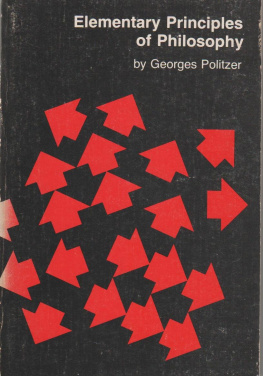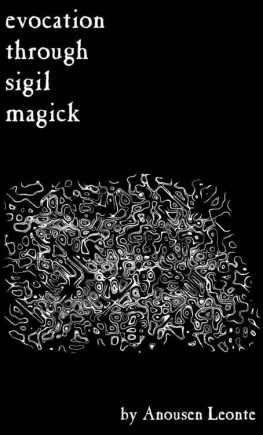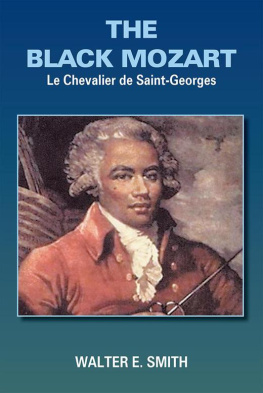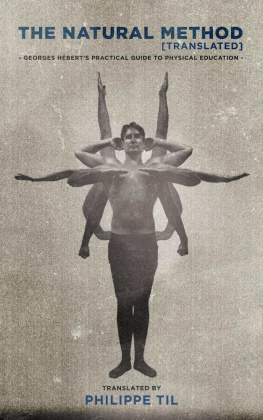Georges Politzer - Elementary Principles of Philosophy
Here you can read online Georges Politzer - Elementary Principles of Philosophy full text of the book (entire story) in english for free. Download pdf and epub, get meaning, cover and reviews about this ebook. year: 1976, genre: Religion. Description of the work, (preface) as well as reviews are available. Best literature library LitArk.com created for fans of good reading and offers a wide selection of genres:
Romance novel
Science fiction
Adventure
Detective
Science
History
Home and family
Prose
Art
Politics
Computer
Non-fiction
Religion
Business
Children
Humor
Choose a favorite category and find really read worthwhile books. Enjoy immersion in the world of imagination, feel the emotions of the characters or learn something new for yourself, make an fascinating discovery.
- Book:Elementary Principles of Philosophy
- Author:
- Genre:
- Year:1976
- Rating:3 / 5
- Favourites:Add to favourites
- Your mark:
- 60
- 1
- 2
- 3
- 4
- 5
Elementary Principles of Philosophy: summary, description and annotation
We offer to read an annotation, description, summary or preface (depends on what the author of the book "Elementary Principles of Philosophy" wrote himself). If you haven't found the necessary information about the book — write in the comments, we will try to find it.
Elementary Principles of Philosophy — read online for free the complete book (whole text) full work
Below is the text of the book, divided by pages. System saving the place of the last page read, allows you to conveniently read the book "Elementary Principles of Philosophy" online for free, without having to search again every time where you left off. Put a bookmark, and you can go to the page where you finished reading at any time.
Font size:
Interval:
Bookmark:
Georges Politzer
GEORGES POLITZER, it was often said, was the embodiment of laughter. Defiant laughter not the laughter of carefree rebelliousness but of the revolutionary; not the anarchists, but the Marxists; laughter that holds up to scorn the old worlds contorted efforts to escape historys condemnation. Laughter that triumphs despite chains, despite Pucheu and Gestapo torturers; laughter triumphant even before the firing squad...
Georges Politzer was born in 1903. His first days were spent in Navyvarod, a small town in northern Hungary; but the government of his native land fell into reactionary hands and his father was persecuted. So, at the age of 17, Politzer was forced to flee. He chose to go to France, and through intellectual and emotional commitment, he became French to his core. No one spoke better than he of the glories of the French spirit. In his fathers house, he had learned the language by reading Voltaire and Diderot; and, once in the Latin Quarter, it took him only five years to obtain all of his degrees, including the certification for professorship in philosophy.
Georges Politzer had in him the stuff of philosophical genius, and like his friend and companion in the torture chamber, Jacques Solomon, was an extraordinary specialist in theoretical physics.
The certain path of Politzers evolvement began in 1926 when he was still struggling to escape from certain idealistic influences. But he fought, he progressed, straining against every barrier. And the culmination of his journey was his encounter with Marxism.
In the early thirties, when the Workers University of Paris was founded in the old neighborhood of Mathurin-Moreau Avenue, it numbered on its staff many remarkable and even famous professors. But the course which generated the most enthusiasm among the students, whether blue-collar workers, white-collar workers, or intellectuals, was Georges Politzers course on dialectical materialism. Thanks to his efforts, the most difficult problems were made clear and simple, without ever losing their philosophical stature or theoretical dignity. Politzers pitiless irony exposed every inconsistency in his adversaries views. A follower of Marx and Lenin, Politzer was a devastating polemicist and a thinker of unimpeachable competence and culture.
Today Marxism has won the right of citizenship at the university, and Marx and Lenin are part of the curriculum. Extensive scholastic works are written on Soviet philosophy. But forty years ago, everything was different: Auguste Cornu appeared as a pioneer, or perhaps a lost child, when he presented his thesis on the formation of the young Marxs ideas to the Sorbonne. Georges Politzers philosophical investigations and writings, along with Auguste Cornus, represented the first important French attempts to clarify the central questions of philosophy in the light of dialectical materialism.
It is difficult now to grasp the full effect of the cleansing wind that rushed through the stagnant fumes of the academic swamp when, in 1929, the young red-headed philosopher, with the air of a young god wreathed by a purifying fire, launched his offensive against the official idealistic school of thought with his publication, The End of a Philosophical MummeryBergsonism. Until the coming of war, Politzer continued his victorious polemic against all the adversaries of Marxism, which he saw as indistin-guishable from modern rationalism. At the same time, he boldly and brilliantly defended the progressive traditions in French philosophical history, starting with the great tradition of Descartes.
Politzer was engrossed by the study of psychology. He attempted to create a new psychology, which he called concrete in opposition to traditional idealist psychology. At first he was influenced by Freuds psychoanalytic school, which was alluring because of its tendency to study the living person as a whole, without isolating narrow psychological functions. But within a short time, starting in 1928, he discerned questionable points in Freudian teaching and separated himself from it with his work Critique of the Foundations of Psychology. Politzers attempt to underline the personalitys social value guarantees the survival of his work as a psychologist.
He taught at the Cherbourg High School, and at Evreux, and finally at Saint-Maur. At the same time, he created and directed the Center of Documentation of the French Communist Partyhis passion for this work often kept him at the Center through the night. He became an economist, and his column in lHumanit won an ever larger public.
Journalism attracted him. This writer can attest to it. I can remember how joyously Politzer would rush to the office when necessary to fill in for me as editor in chief of the Communist daily in the years 1937-1939. Maurice Thorez became most fond of this exceptional militant.
Then came the phony war. Called into service at the Military School in Paris, Politzer retained close contact with the clandestine leadership of the Communist Party. On June 6, 1940, it was Politzer who transmitted to Anatole de Monzie, representative of the French government, the historic proposals of the Communist Party for the defense of Paris by a general mobilization of the people.
In combination with his admirable companion, Maie Politzer, who perished in the horror of the Nazi camps, Politzer was the soul of the universitys resistance from 1940 to 1942. There is no need to repeat that his courage was equal to every test, but his disarming fearlessness and superb daring must be recorded.
From the time of his discharge in July of 1940, Politzer, along with Jacques Solomon and Daniel Decourdemanche, put out a clandestine paper for high school and college teachers. The first issue of IUniversit libre (The Free University) appeared immediately after the arrest of Paul Langevin by the Gestapo in October. The paper described the imprisonment of the famous physicist and also covered the other outrages committed by the fascist invader. It added:
In the face of these events, the University has taken hold of itself; it has attained a unanimity of thought and of will surpassing anything in its glorious history. It has asserted with unanimity its intention to continue, through all, despite all, the great tradition of culture in freedom which has been and remains the tradition of the French University.
From then on IUniversite libre struggled against the institutions of the enemy in university affairs, against the arrests of Jewish professors and students, against retrograde changes in the curriculum, against the so- called national revolution which was really a reactionary undertaking in the service of Nazi imperialism. The newspaper undauntedly sparked resistance in high schools and colleges. The pages of IUniversite libre from the years 1940-1941 constitute the most striking evidence of Com-munist involvement in the struggle for liberation from the very beginning of the occupation. Eight issues were published before January 1941, and twenty issues before June 1941.
When the Hitlerian offensive against the Soviet Union was unleashed, the twenty-second issue lUniversit libre, dated July 1, 1941, declared, under the headline Hitlers Tomb, that victory was certain for the united army of a united people, for the new army of a new society.
In March 1941, an anti-Nazi pamphlet with exceptional vigor and bite began circulating in the patriotic camp. The work was unsigned, but the style was universally recognized. Everyone knew that Revolution and Counterrevolution in the 20th Century was Politzers work. The pamphlet printed in January and February, was 45 pages long. It was a stunning reply to Reichsleiter Rosenbergs speech to the French Chamber of Deputies in late November 1940, which called for a settling of accounts with the ideas of 1789 and which bore the title Blood and Gold, or Gold Conquered by Blood.
Font size:
Interval:
Bookmark:
Similar books «Elementary Principles of Philosophy»
Look at similar books to Elementary Principles of Philosophy. We have selected literature similar in name and meaning in the hope of providing readers with more options to find new, interesting, not yet read works.
Discussion, reviews of the book Elementary Principles of Philosophy and just readers' own opinions. Leave your comments, write what you think about the work, its meaning or the main characters. Specify what exactly you liked and what you didn't like, and why you think so.






![Kevin B. Burk - Principles of Practical Natal Astrology: Talented Astrologer Training Book 1 [FIXED Layout EPUB]](/uploads/posts/book/156304/thumbs/kevin-b-burk-principles-of-practical-natal.jpg)





